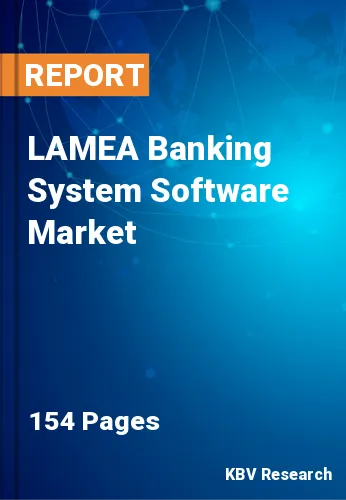The Latin America, Middle East and Africa Banking System Software Market would witness market growth of 8.7% CAGR during the forecast period (2022-2028).
A further improvement in the customer experience and a rise in the degree of convenience for end users will result from implementing artificial intelligence (AI) in banking and financial services. AI technology shortens the time needed to collect Know Your Customer (KYC) data and eradicates the possibility of making mistakes. In addition, additional services and financial deals may be made available at the appropriate moment. Consumers are always looking for a more convenient experience. For instance, ATMs were successful because they allowed clients to access necessary services like money withdrawal and deposit even when banking institutions were closed.
More innovation has only been spurred by this level of convenience. Consumers can now use their smartphones to set up bank accounts from the convenience of their own homes. Clients can avoid the inconvenience of going through the full process manually by using artificial intelligence to automate eligibility for scenarios like asking for a credit or personal loan. Furthermore, AI-based software can speed up approval processes for services like loan disbursement. Additionally, AI banking aids in the precise collection of client data for error-free account setup, delivering a positive customer experience.
The growing domestic banking sector in the United Arab Emirates is governed by the central bank. The Central Bank establishes credit, monetary, and banking policy as well as oversees its application in a way that promotes the domestic economy and currency stability, all in conformity with the general policy of the state. It manages the UAE government's gold as well as foreign currency reserves, serves as the bank for regional financial institutions, and advocates the UAE government's economic interests before international financial bodies. Islamic banking has expanded dramatically in recent years, accounting for a sizable portion of the UAE's financial industry. These elements would support the growth of the regional market.
The Brazil market dominated the LAMEA Banking System Software Market by Country in 2021, and would continue to be a dominant market till 2028; thereby, achieving a market value of $866.4 million by 2028. The Argentina market is experiencing a CAGR of 9.3% during (2022 - 2028). Additionally, The UAE market would display a CAGR of 8.5% during (2022 - 2028).
Based on Application, the market is segmented into Transaction Management, Credit & Lending, Risk & Compliance, Customer Relationship Management, Investment Management and Others. Based on Operating System, the market is segmented into Android, Windows, iOS and Others. Based on Deployment Mode, the market is segmented into On premise and Cloud. Based on Organization Size, the market is segmented into Large Enterprises and Small & Medium Enterprises. Based on Component, the market is segmented into Software (Without Services) and Services. Based on Software (Without Services) Type, the market is segmented into Core Banking System Software, Corporate Banking System Software, Investment Banking System Software and Others. Based on countries, the market is segmented into Brazil, Argentina, UAE, Saudi Arabia, South Africa, Nigeria, and Rest of LAMEA.
Free Valuable Insights: The Global Banking System Software Market is Predict to reach $46.8 Billion by 2028, at a CAGR of 5.9%
The market research report covers the analysis of key stake holders of the market. Key companies profiled in the report include IBM Corporation, Microsoft Corporation, SAP SE, Salesforce.com, Inc., Oracle Corporation, Tata Consultancy Services Ltd., Infosys Limited, Fiserv, Inc., Fidelity National Information Services, Inc., and Finastra Group Holdings Limited (Vista Equity Partners).
By Application
By Operating System
By Deployment Mode
By Organization Size
By Component
By Country
Our team of dedicated experts can provide you with attractive expansion opportunities for your business.

